Classical literature: Difference between revisions
(Created page with "== Origins and Development == Classical literature, also known as ancient literature, refers to the literature of the ancient civilizations of Greece and Rome. This period of literature began with the epic poetry of Homer in the 8th century BC and extended through the fall of the Western Roman Empire in the 5th century AD. The literature of this period is characterized by its use of classical languages, primarily Ancient Gr...") |
No edit summary |
||
| Line 3: | Line 3: | ||
Classical literature, also known as [[Classical Antiquity|ancient literature]], refers to the literature of the ancient civilizations of Greece and Rome. This period of literature began with the epic poetry of Homer in the 8th century BC and extended through the fall of the Western Roman Empire in the 5th century AD. The literature of this period is characterized by its use of [[Classical Language|classical languages]], primarily Ancient Greek and Latin, and its exploration of themes such as heroism, honor, and the human condition. | Classical literature, also known as [[Classical Antiquity|ancient literature]], refers to the literature of the ancient civilizations of Greece and Rome. This period of literature began with the epic poetry of Homer in the 8th century BC and extended through the fall of the Western Roman Empire in the 5th century AD. The literature of this period is characterized by its use of [[Classical Language|classical languages]], primarily Ancient Greek and Latin, and its exploration of themes such as heroism, honor, and the human condition. | ||
[[Image:Detail-77973.jpg|thumb|center|Ancient scroll with Greek writing|class=only_on_mobile]] | |||
[[Image:Detail-77974.jpg|thumb|center|Ancient scroll with Greek writing|class=only_on_desktop]] | |||
The earliest known works of classical literature are the epic poems of Homer, the [[Iliad]] and the [[Odyssey]]. These works, composed in the 8th century BC, are considered the foundational texts of Western literature. They are characterized by their use of [[Dactylic Hexameter|dactylic hexameter]], a form of meter common in ancient Greek poetry, and their exploration of themes such as heroism, honor, and the human condition. | The earliest known works of classical literature are the epic poems of Homer, the [[Iliad]] and the [[Odyssey]]. These works, composed in the 8th century BC, are considered the foundational texts of Western literature. They are characterized by their use of [[Dactylic Hexameter|dactylic hexameter]], a form of meter common in ancient Greek poetry, and their exploration of themes such as heroism, honor, and the human condition. | ||
Latest revision as of 17:22, 8 May 2024
Origins and Development
Classical literature, also known as ancient literature, refers to the literature of the ancient civilizations of Greece and Rome. This period of literature began with the epic poetry of Homer in the 8th century BC and extended through the fall of the Western Roman Empire in the 5th century AD. The literature of this period is characterized by its use of classical languages, primarily Ancient Greek and Latin, and its exploration of themes such as heroism, honor, and the human condition.


The earliest known works of classical literature are the epic poems of Homer, the Iliad and the Odyssey. These works, composed in the 8th century BC, are considered the foundational texts of Western literature. They are characterized by their use of dactylic hexameter, a form of meter common in ancient Greek poetry, and their exploration of themes such as heroism, honor, and the human condition.
Following the works of Homer, the classical period saw the development of various forms of literature, including tragedy, comedy, and history. The works of playwrights such as Aeschylus, Sophocles, and Euripides, historians like Herodotus and Thucydides, and philosophers like Plato and Aristotle, are considered seminal works in their respective genres.
Greek Literature
Greek literature of the classical period is characterized by its diversity of genres and styles. The most significant genres of this period are epic poetry, tragedy, comedy, and history.
Epic poetry, as exemplified by the works of Homer, is characterized by its grand scale and heroic themes. The Iliad and the Odyssey, the two most famous epic poems of this period, are considered the foundational texts of Western literature.
Tragedy, a genre that developed in Athens in the 5th century BC, is characterized by its exploration of themes such as fate, justice, and the human condition. The works of Aeschylus, Sophocles, and Euripides, the three most significant tragedians of this period, are considered the pinnacle of Greek tragedy.
Comedy, another genre that developed in Athens in the 5th century BC, is characterized by its use of satire and farce to critique social and political issues. The works of Aristophanes, the most famous comedian of this period, are considered the pinnacle of Greek comedy.
History, as exemplified by the works of Herodotus and Thucydides, is characterized by its objective and analytical approach to the past. These historians are considered the founders of Western historiography.
Roman Literature
Roman literature, which developed from the 3rd century BC to the 5th century AD, is characterized by its adaptation and development of Greek literary forms. The most significant genres of this period are epic poetry, tragedy, comedy, history, and philosophy.
Epic poetry, as exemplified by the works of Virgil, is characterized by its grand scale and heroic themes. The Aeneid, the most famous epic poem of this period, is considered the pinnacle of Roman epic poetry.
Tragedy, a genre that developed in Rome in the 1st century BC, is characterized by its exploration of themes such as fate, justice, and the human condition. The works of Seneca, the most significant tragedian of this period, are considered the pinnacle of Roman tragedy.
Comedy, another genre that developed in Rome in the 2nd century BC, is characterized by its use of satire and farce to critique social and political issues. The works of Plautus and Terence, the most famous comedians of this period, are considered the pinnacle of Roman comedy.
History, as exemplified by the works of Livy and Tacitus, is characterized by its objective and analytical approach to the past. These historians are considered the founders of Roman historiography.
Philosophy, a genre that developed in Rome in the 1st century BC, is characterized by its exploration of themes such as ethics, metaphysics, and logic. The works of Cicero, Seneca, and Marcus Aurelius, the most significant philosophers of this period, are considered the pinnacle of Roman philosophy.
Influence and Legacy
The influence of classical literature on Western culture and thought cannot be overstated. The works of Homer, Aeschylus, Sophocles, Euripides, Aristophanes, Herodotus, Thucydides, Plato, Aristotle, Virgil, Seneca, Plautus, Terence, Livy, Tacitus, Cicero, and Marcus Aurelius, among others, have shaped Western literature, history, philosophy, and culture in profound ways.
The themes, styles, and forms of classical literature continue to be studied and adapted in modern times. The works of this period are considered the foundation of Western literature and continue to be read and studied for their literary and historical value.
